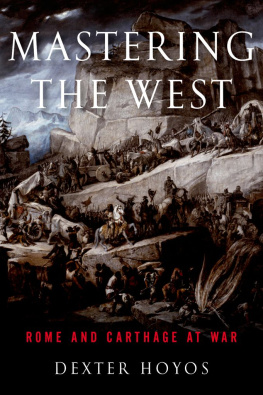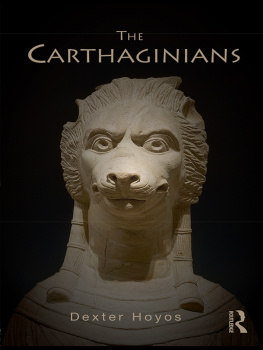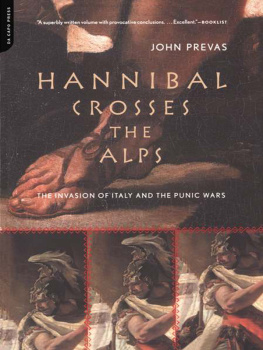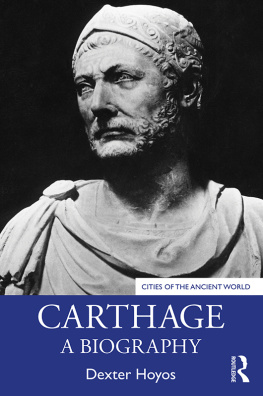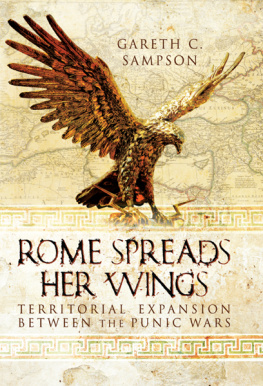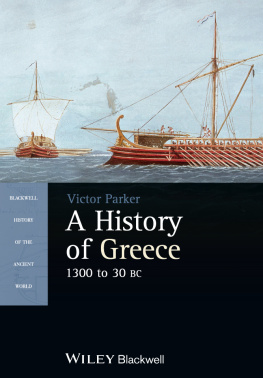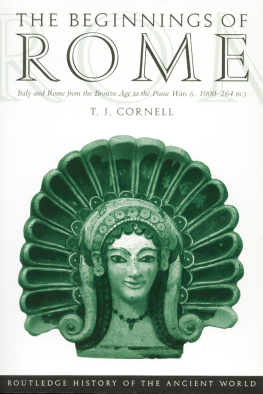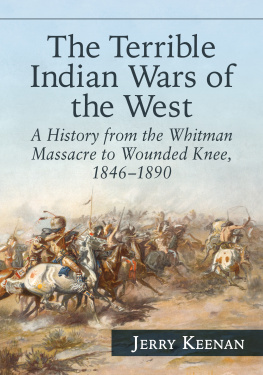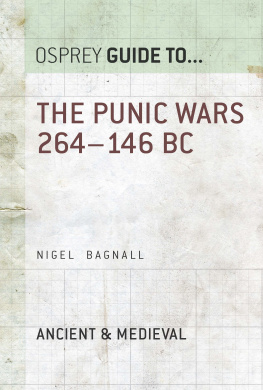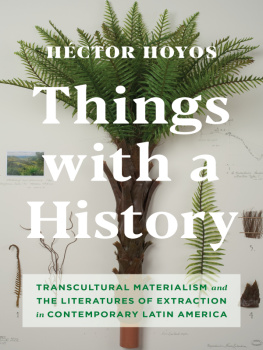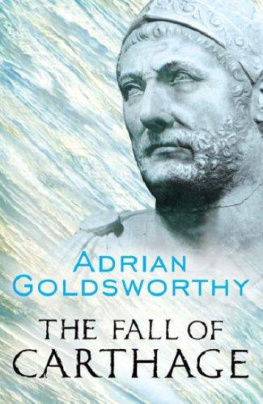Hoyos - Mastering the West: a history of the Punic Wars
Here you can read online Hoyos - Mastering the West: a history of the Punic Wars full text of the book (entire story) in english for free. Download pdf and epub, get meaning, cover and reviews about this ebook. City: Carthage (Extinct city);Mediterranean Region;Rome;Rome (Empire);Tunisia;Carthage (Extinct city, year: 2015;2014, publisher: Oxford University Press, Incorporated, genre: History. Description of the work, (preface) as well as reviews are available. Best literature library LitArk.com created for fans of good reading and offers a wide selection of genres:
Romance novel
Science fiction
Adventure
Detective
Science
History
Home and family
Prose
Art
Politics
Computer
Non-fiction
Religion
Business
Children
Humor
Choose a favorite category and find really read worthwhile books. Enjoy immersion in the world of imagination, feel the emotions of the characters or learn something new for yourself, make an fascinating discovery.
- Book:Mastering the West: a history of the Punic Wars
- Author:
- Publisher:Oxford University Press, Incorporated
- Genre:
- Year:2015;2014
- City:Carthage (Extinct city);Mediterranean Region;Rome;Rome (Empire);Tunisia;Carthage (Extinct city
- Rating:3 / 5
- Favourites:Add to favourites
- Your mark:
- 60
- 1
- 2
- 3
- 4
- 5
Mastering the West: a history of the Punic Wars: summary, description and annotation
We offer to read an annotation, description, summary or preface (depends on what the author of the book "Mastering the West: a history of the Punic Wars" wrote himself). If you haven't found the necessary information about the book — write in the comments, we will try to find it.
Hoyos: author's other books
Who wrote Mastering the West: a history of the Punic Wars? Find out the surname, the name of the author of the book and a list of all author's works by series.
Mastering the West: a history of the Punic Wars — read online for free the complete book (whole text) full work
Below is the text of the book, divided by pages. System saving the place of the last page read, allows you to conveniently read the book "Mastering the West: a history of the Punic Wars" online for free, without having to search again every time where you left off. Put a bookmark, and you can go to the page where you finished reading at any time.
Font size:
Interval:
Bookmark:


Ancient Warfare and Civilization
| SERIES EDITORS: | |
| RICHARD ALSTON | ROBIN WATERFIELD |
In this series, leading historians offer compelling new narratives of the armed conflicts that shaped and reshaped the classical world, from the wars of Archaic Greece to the fall of the Roman Empire and the Arab conquests.
Dividing the Spoils
The War for Alexander the Greats Empire
Robin Waterfield
By the Spear
Philip II, Alexander the Great, and the Rise and Fall of the Macedonian Empire
Ian Worthington
Taken at the Flood
The Roman Conquest of Greece
Robin Waterfield
In Gods Path
The Arab Conquests and the Creation of an Islamic Empire
Robert G. Hoyland
Mastering the West
Rome and Carthage at War
Dexter Hoyos

Oxford University Press is a department of the University of
Oxford. It furthers the Universitys objective of excellence in research,
scholarship, and education by publishing worldwide.
OxfordNew York
AucklandCape TownDar es SalaamHong KongKarachi
Kuala LumpurMadridMelbourneMexico CityNairobi
New DelhiShanghaiTaipeiToronto
With offices in
ArgentinaAustriaBrazilChileCzech RepublicFranceGreece
GuatemalaHungaryItalyJapanPolandPortugalSingapore
South KoreaSwitzerlandThailandTurkeyUkraineVietnam
Oxford is a registered trademark of Oxford University Press in the UK and certain other countries.
Published in the United States of America by
Oxford University Press
198 Madison Avenue, New York, NY 10016
Oxford University Press 2015
All rights reserved. No part of this publication may be reproduced, stored in a retrieval system, or transmitted, in any form or by any means, without the prior permission in writing of Oxford University Press, or as expressly permitted by law, by license, or under terms agreed with the appropriate reproduction rights organization. Inquiries concerning reproduction outside the scope of the above should be sent to the Rights Department, Oxford University Press, at the address above.
You must not circulate this work in any other form and you must impose this same condition on any acquirer.
Library of Congress Cataloging-in-Publication Data
Hoyos, B. D. (B. Dexter), 1944
Mastering the West : Rome and Carthage at war / Dexter Hoyos.
ISBN 9780199860104 (hardcover : acid-free paper)
eISBN 9780199391745
1.Punic wars.
2.Command of troopsHistoryTo 1500.3.Mediterranean RegionHistory, Military.
4.Mediterranean RegionHistoryTo 476.5.RomeHistory, Military.
6.Carthage (Extinct city)History, Military.I.Title.
DG242.H69 2015
937.04dc23
2014015832


.
).
.
.
).
).
.
).
).
.
.
).
.
.
).
).
All maps prepared by the Author

IT IS A SPECIAL pleasure to acknowledge the encouragement and advice that I have had over a long period of writing. Richard Alston and Robin Waterfield originated the suggestion of a study of the Punic Wars in the context of ancient warfare and civilization. Their vigilant and invariably helpful scrutiny has been matched by that of Stefan Vranka, Oxford University Presss senior editor in Classics, ancient history, and archaeology. I deeply appreciate too their unvarying patience with an author who found his progress slower than he had too-confidently forecast. It gives me immense pleasure to thank the copy editor and book editor for their keen-eyed vigilance with this title. I also thank Sarah Pirovitz at Oxford University Press (New York) for her invaluable help with the artworks in this title. I could not have written this book without the study facilities of Sydney University and Macquarie University, both of which have generously accorded me honorary research affiliateships. The work would not have been feasible, in turn, without the understanding and care of my wife, Jann; our daughter, Camilla; her husband, Anthony; and a tiny granddaughter named Scarlett.
IN THE THIRD AND second centuries BC the two leading states of the western Mediterranean, Rome and Carthageboth republics, closely linked by trade, and with political and military interests previously focused on differing regionsfought three wars, which decided the fate of their own lands and of those others in the West that were drawn into them. The First Punic War, from 264 to 241 BC, and the Second and most famous, from 218 to 201, were on a scale far beyond most other ancient conflictsa point made as early as their first surviving historian, the Greek Polybius, himself present during Romes operations against Carthage in the Third.
The First war ranged over a relatively narrow area of the central Mediterranean: Sicily and its waters and briefly Sardinia and North Africa. Yet the combatants put sometimes huge forces into actioneven if Polybius may exaggerate themand sometimes huge losses befell these. The Second, in its turn, was the most titanic Mediterranean struggle before the Roman civil wars of Julius Caesars day 200 years later. It was fought across Italy, Spain, the western Mediterranean islands, and North Africa; it also led to Romes first Macedonian war because Macedon chose to side with Carthage. The Third was more concentrated, this time in North Africa; but it drained far more resources in men, munitions, and money than either side foresaw.
The Punic Wars opened almost by accident, affected the lives and fortunes of millions (not all of them Carthaginians or Romans), destroyed one empire, and launched another. When they began in 264 BC Rome was a rising but middle-level power that had only just imposed her control over peninsular Italy; Carthage was a major state directly or indirectly ruling much of North Africa, Sicily, and Sardinia. When the Third war was launched just over a century later, the situations were almost exactly reversed. How it all happened is a story blended of calculation and (just as often) miscalculation, heroism, cruelty, stubborn resolve, and the unexpected.
The wars lasting fame rests above all on the renown of two men: Carthages general Hannibal and his Roman adversary Scipio Africanus, both in the Second. Hannibals blend of charismatic leadership, risk-taking dash, and tactical genius has always won admirationeven from Romans, once he had passed awayand, from time to time, imitators. If in the end he failed, it was a failure whose brilliance eclipsed most of the ancient worlds successful generals. Scipio Africanus was an even greater commander. No less charismatic and risk-taking, he never lost a battle or a campaign, in a career that put Rome on the path to mastery over the Mediterranean West. Ironically, both men died around the same time in self-imposed exile, estranged from their ungrateful homelands.
The conflicts produced a gallery of other notable figures whose memory too has endured. The First wars Marcus Regulus, in a pleasing legend, sacrificed himself rather than urge Rome to beg for peace; Hannibals father, Hamilcar Barca, saved Carthage in her worst crisis and created her second empire after Rome struck down the first. Against Hannibal, Fabius the Delayer by delaying restored our fortunes in the contemporary poet Enniuss proverbial paradox; Claudius Marcellus conquered Syracuse and lamented the slaughter of the scientist Archimedes (himself another figure of note). A young Carthaginian woman, Sophoniba, became queen of Numidia to meet a tragic fate that engrossed later romantic fancy. The Third war owed much to the old and unforgiving Cato the Censors strident pressure for it, remembered by later ages (inaccurately) as a cry that Carthage must be destroyed. Scipio Aemilianus, Africanuss adoptive grandson, proved himself another unforgiving enemy of Carthageas he would be of other accused transgressors, his own cousin among them.
Font size:
Interval:
Bookmark:
Similar books «Mastering the West: a history of the Punic Wars»
Look at similar books to Mastering the West: a history of the Punic Wars. We have selected literature similar in name and meaning in the hope of providing readers with more options to find new, interesting, not yet read works.
Discussion, reviews of the book Mastering the West: a history of the Punic Wars and just readers' own opinions. Leave your comments, write what you think about the work, its meaning or the main characters. Specify what exactly you liked and what you didn't like, and why you think so.

